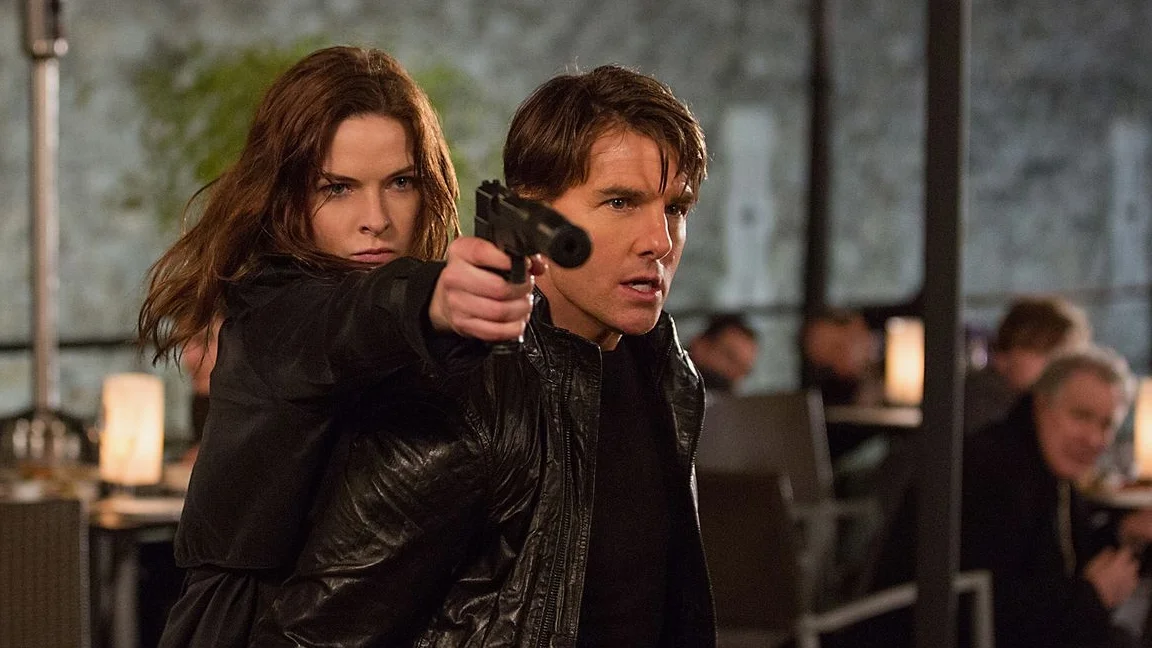Desperate Times, Desperate Measures: Mission: Impossible - Rogue Nation
If nothing else, the Mission: Impossible franchise has distinguished itself from other properties due to its transformations. After all, until this week, with Mission: Impossible Fallout, each of the entries has been helmed by a different director. However, no Mission: Impossible film has separated itself quite like the fifth film in the series, Mission: Impossible - Rogue Nation.
With director Christopher McQuarrie, who cut his teeth on films like The Usual Suspects and Jack Reacher, Mission: Impossible goes down roads it has never traveled before. This does not mean that it doesn’t feel like a Mission: Impossible film. In several ways, it hits the beats that we associate with M:I. It opens with the insane stunts from Tom Cruise that we have come to expect, this time hanging on to the side of a plane as it takes off, for god’s sake. Rogue Nation also features everything we love about the franchise: the theme song, the twisting plot, the self-destructing message. But all of these seem just a bit off kilter, at least enough to keep us guessing, something that most Mission: Impossible movies can’t quite claim.
One thing everyone can agree on is that Tom Cruise, maybe our last true movie star, is the face of the franchise. Even if they tried to foist Jeremy Renner on us in the previous film; that was never really going to happen, right? That being said, in Rogue Nation, Cruise takes, if not a step back, at least a step to the side. He does this to make room for the true star of the film, Rebecca Ferguson. Ferguson, playing double agent Ilsa Faust, not only deftly handles the spy-speak and the action sequences, but also holds her own with uberstar Cruise with seemingly little effort. Although the film never truly pauses to show us the romance between the two, the palpable tension between them is readily apparent at every breakneck turn.
As a matter of fact, where most of the M:I films are questionable at best when it comes to its female cast members, Rogue Nation flips the script. Not only is Ilsa not a damsel in distress, she saves our usual hero, Ethan Hunt, at pretty much every turn. Without her, Hunt never makes it out of the underwater sequence, and possibly not past their original meeting. This is a distinct change from the other films. Sure, Hunt has always had help from the IMF team, but never before has he shown such vulnerability. As a matter of fact, the film uses this as a source of levity, with Simon Pegg’s Benji showing the utmost faith in Hunt, no matter the situation. And why wouldn’t he, given what Hunt has achieved in the past? But Hunt is more weathered, and knows exactly what he is up against, and seems aware that this could be his last impossible mission. Tom Cruise’s facial expressions, playing on his advancing age and experience in these life or death situations, shows us that maybe Benji’s faith might be the tiniest bit misplaced. Time and time again, Ilsa steps in and allows Hunt to survive so he can eventually save the day, with the help of her and the IMF team, of course. Gone are the days of Ethan Hunt, superhero. Here are the days of the Ethan Hunt who will survive because of his friends and his hyper intelligence.
Another difference is the philosophical bent of the discussions between Ilsa, Hunt, and our villain, Solomon Lane, played by Sean Harris. Now having a villain who has been a part of these types of missions is nothing new, see the first film in the franchise for the most obvious example. But the analysis of innocence, responsibility, and morality has never been handled with such care and depth. Whereas every other film in the franchise doesn’t take much time to question if the team has value or if Hunt should keep moving forward like the force of nature he is, Rogue Nation forces him to come to terms with these choices. After all, as Ilsa tells us and Ethan, “There will always be another Lane. There will always be people like us to face him.” For perhaps the first time, there is a reason for us to root for Ethan to do the unthinkable, simply walk away.
What Mission: Impossible - Rogue Nation does best is flout the audience’s expectations. Pretty much every beat, aside from the absolutely fantastic action sequences, is not what you think. The detail of the mission is a trap, the theme music goes in fits and starts, the man in the mask is probably not who you think, and a franchise in its fifth film over 20 years can still surprise and entertain us. Although just about every film in the Mission: Impossible franchise has been fun to watch, Rogue Nation may be the first to stretch the characters, and the world, in a way that makes us anxiously await the next chapter.








